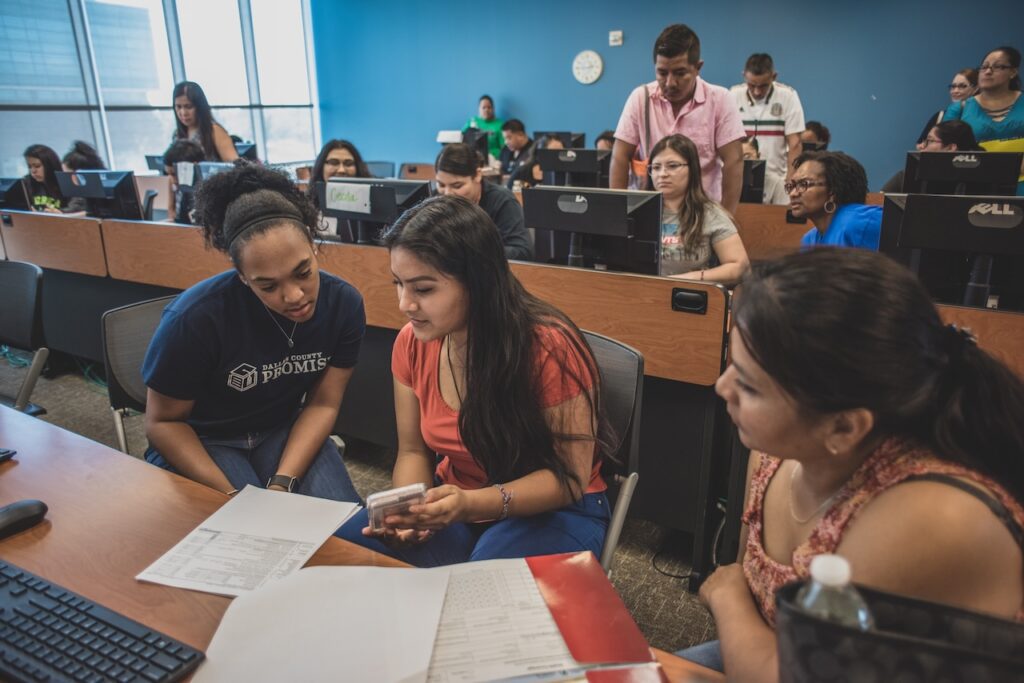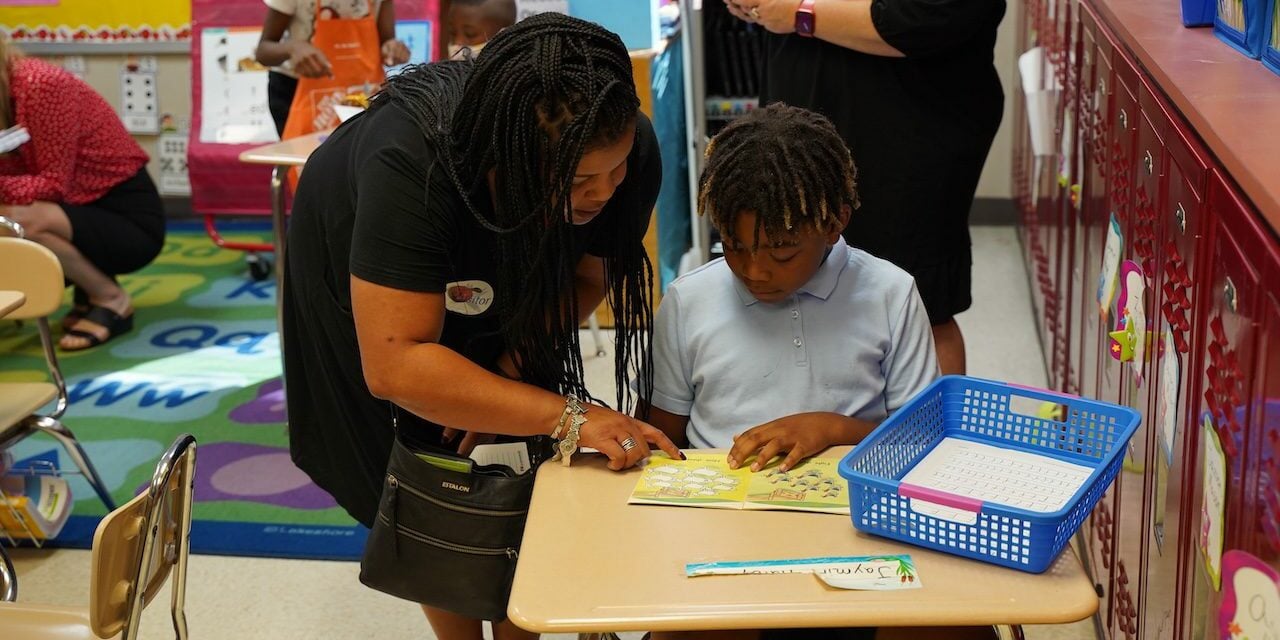Across Dallas County, The Commit Partnership is championing a comprehensive approach to ensure every child is successful from cradle to career. Through strategic initiatives spanning early childhood, K-12 education, and postsecondary and workforce readiness, Commit has emerged as a catalyst for equitable data use and transformative change, driving significant improvements in life outcomes.
Now, their work has earned the Cradle to Career Network member the Systems Transformation designation along the StriveTogether Theory of Action™, the most advanced stage along our framework for change.
Building foundations for success in early childhood
The partnership’s commitment to equitable outcomes begins with the county’s youngest learners. Collaborating with Groundwork DFW, a local nonprofit, Commit facilitated a grassroots pre-K enrollment campaign to increase applications in Dallas County neighborhoods with historically low enrollment rates. The approach includes a multi-tiered structure and continuous feedback loops, ensuring a dynamic response to community needs. 
Data-driven decision-making is a cornerstone of Commit’s strategy. By providing eligible pre-K population and enrollment data to Groundwork DFW, Commit enables adaptive outreach throughout the year. Monthly updates inform adjustments to the campaign, ensuring resources are directed where they’re needed most. Groundwork’s innovative “Feedback Friday” sessions loop community feedback to the partnership to address concerns. One recurring theme they heard was that the community did not trust pre-K providers. In response, Groundwork piloted putting cameras in classrooms to support trust-building between the community and providers.
The impact of the community coalescing around early education and pre-K is evident. Pre-K enrollment in Dallas County increased from 35% in 2012 to 50% in 2022, reflecting a steadfast effort to provide early education opportunities for all children.
Nurturing academic growth and equity in K-12
Increased pre-K enrollment has also positively impacted later student achievement, including a 20 percentage point rise in third grade reading scores in Lancaster Independent School District from 2021 to 2022. Data shows that a majority of the Lancaster ISD 2022 third grade class attended pre-K in 2018, indicating the lasting benefits of pre-K attendance on third grade success.
Commit’s policy and advocacy work is also using data to scale equity for advanced math pathways starting in sixth grade. In 2019, Dallas Independent School District passed a policy that changed how students were tracked into advanced or honors math. Inspired by this work, Commit successfully advocated for opt-out math policies for high-achieving students in the 88th Texas Legislature, alongside a coalition of statewide partners. 
Through this legislation, Senate Bill 2124, school systems across the state of Texas are now required to automatically enroll high-performing fifth graders in advanced math pathways, enabling more districts to follow in Dallas ISD’s footsteps. This policy is closing equity gaps in access to advanced math and college-aligned courses in high school.
Despite COVID-19 interruptions, enrollment in Dallas ISD’s honors math pathway has steadily grown, with 94% of students who met grade-level standards in fifth grade math being enrolled in sixth grade honors math. Black and emergent bilingual students are represented in nearly equal proportion to white students. This policy has not led to a decrease in student achievement in these classes as some may have feared, with 2022’s eighth grade Algebra I students achieving similar pass rates as previous years.
Commit also works to ensure schools and neighborhoods are well-resourced, including through bond elections. In 2020, Commit helped support a bond election campaign for Dallas ISD, which was successfully passed by voters. Dallas ISD then used data from the Community Resource Index, a tool developed by Commit partner The Child Poverty Action Lab, to inform strategic allocation of funds. As a result, Dallas ISD directed $40 million of bond funding to under-resourced schools, positively impacting 111,246 students.
Addressing disciplinary disparities, Commit played a pivotal role in Dallas ISD’s groundbreaking decision to eliminate discretionary suspensions. Commit supported Dallas ISD in using data analytics by leveraging the Community Resource Index to strategically place social-emotional health-focused “Reset Centers” where they were needed most.
Results have been promising, with an 80% reduction in disciplinary actions since the introduction of reset centers. Notably, Black students, once disproportionately affected, have seen a significant decline in overrepresentation.

Bridging the opportunity gap in postsecondary and workforce outcomes
Alongside higher education partners like Dallas College and the University of North Texas – Dallas, Commit launched the Dallas County Promise to provide a clear and affordable degree pathway — including advising support — for thousands of high school seniors. In addition to supporting students, the Dallas County Promise model builds district capacity to better support college access strategies and hold themselves accountable for the long-term postsecondary outcomes of their students.
Since launching in 2018 with 9,300 students at 31 high schools, the Dallas County Promise has grown to serve over 27,000 students in 82 high schools across 12 school districts. Dallas County Promise’s data-driven approach is being used to address “summer melt,” where students are accepted into college but don’t enroll in the fall. Their work with Richardson ISD exemplifies a strategic response to data insights. By having a staff person available during the summer on every high school campus, their district saw a 62% postsecondary enrollment rate in fall of 2022, compared to 51% program-wide.
Commit also addresses postsecondary and workforce outcomes through advocacy. The partnership was instrumental in advocating for the passage of House Bill 3 in 2019, which injected $3.25 billion in new annual funding for all districts in Texas, plus $4 billion in optional additional funds for innovative equity strategies. The partnership also advocated for House Bill 8 during the 2023 Texas legislative session. The bill, signed into law, aligns state funding for community colleges with student outcomes, addressing longstanding financial disparities. The $678 million investment marks a historic step toward equitable postsecondary education.
The Commit Partnership’s work to advance equitable outcomes from cradle to career in Dallas County is a testament to the transformative power of collaboration, data-driven decision-making and proactive policy advocacy. Explore stories from other communities leading transformation here.






